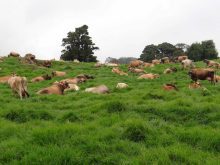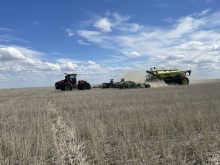The Canadian Wheat Board is being sued for more than $50 million by a Saskatchewan farm that has its delivery contract cancelled for delivering an ineligible variety of red spring wheat.
But industry officials say the lawsuit by Hudye Farms Inc. and two associated companies is really a test of the four-year-old grain variety declaration system.
“The wheat board’s name may be on the statement of claim but it’s a challenge of the wheat quality control system of Canada that all the players in the grain industry strongly support,” said CWB spokeswoman Maureen Fitzhenry.
Read Also

Alberta farmer invited to World Economic Forum
Southern Albertan farmer’s regenerative agricultural practices featured on panels at Davos where nations come together in partnership.
Under the system’s rules, farmers delivering wheat board or non-board grains to an elevator must sign a legal agreement stating they are not delivering ineligible varieties and acknowledging can be held liable for the damages if they do.
In its statement of claim against the CWB, Hudye Farms of Norquay, Sask., says it did not default on its delivery contract and is therefore owed more than $177,000 for grain, $8,000 in testing fees, $52,000 in losses sustained from cancelled contracts, $10,000 for losses resulting from the downgrading of 122 tonnes of wheat it delivered, and almost $248,000 in interest. It’s also asking for $10 million for breaching of fiduciary duty, $25 million for defamation, and $15 million in punitive damages.
Fitzhenry said the CWB has done nothing wrong. It cancelled Hudye Farms’s delivery contract when it was discovered the company delivered an ineligible variety of wheat, 606 Granite, to the Canada Western Red Spring wheat class. While 606 Granite is registered in Eastern Canada it’s not registered as a Canada Western Red Spring wheat.
The CWB’s wheat delivery contract states farmers are in default if, among things “any portion of the wheat delivered by the producer to the CWB contains any non-registered variety.”
Industry confident
The grain variety declaration system was implemented for wheat in 2006 and extended to non-board grains this fall. It is supported by the CWB, Canadian Grain Commission (CGC), grain companies and farm organizations in order to protect the quality of Western wheat and prevent farmers and grain companies from the costs related to downgrading due to the delivery of ineligible varieties.
The declaration system is expected to hold up in spite of the lawsuit, said Wade Sobkowich, the executive director of the Western Grain Elevator Association.
“I don’t think it puts our protocol in jeopardy whatsoever,” said Sobkowich. “We’re going on the basis that the individual that causes the damage ought to pay for it. And I don’t think any reasonable person can dispute that.”
The Hudye Farms case is one of the first involving a farmer found to have delivered an ineligible variety, said Fitzhenry.
Hudye Farms’ suit claims the wheat it delivered was cleared by the CWB’s buying agent, Cargill, and by the CGC. But Cargill and the CGC merely graded the wheat, according to Fitzhenry.
“By signing the declaration, the farmer is legally responsible for ensuring what they have grown, and what they are delivering, is a variety that’s eligible for the class it’s being delivered into,” she said.
The CWB contract also says farmers who default shall pay the CWB damages caused by the default and can have their delivery opportunities restricted.
“This is actually good in a way to bring attention to this so that the impact of misdeclaring could have on farmers,” Sobkowich said. “Hopefully it prompts people to take another look at what they’re doing on their farms and know that there can be some real consequences for not having proper practices in place.
The suit says by not selling Hudye Farms’ wheat, the CWB failed in its fiduciary duty since it is the only marketer of wheat.
“What troubles us the most about this dispute is that as a farmer in Western Canada we don’t have a choice on where we can sell our milling wheat,” Hudye Farms president Ben Hudye said in a news release. “I believe that farmers should be able to determine how and to whom we sell the fruits of our labour.”
Hudye was a member of the Farmers For Justice, a loosely organized group of producers who illegally exported grain to the United States in the mid 1990s to protest the CWB’s single desk marketing authority.
In 1996, Hudye pleaded guilty to smuggling a herbicide from Canada where it was registered, into the United States, where it wasn’t. He was fined $10,000, sentenced to three days in jail, followed by one year of supervised release and ordered to pay $25 to the crime victim’s fund.














